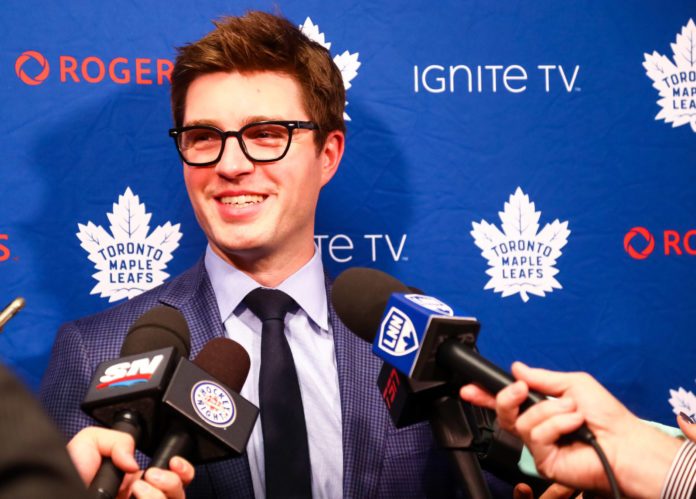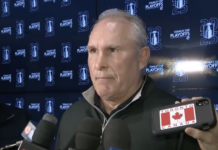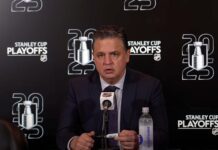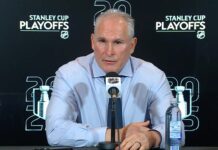
After the announcement of Jason Spezza’s retirement, GM Kyle Dubas discussed his contributions to the organization on and off the ice and the vision for Spezza’s future in the organization’s front office.
Kyle Dubas’ opening remarks on the retirement of Jason Spezza, his role in the front office
Dubas: I’ll try to keep this as brief as possible and turn everything over to Jason. It is his day to celebrate his career and begin to take the next step for him in hockey.
I will begin by saying that I appreciate everyone joining us here on a Sunday afternoon. It will be unsurprising to those that know him that one of the key things for Jason is that he wanted to get going on the next phase of his career, but he wanted to be very cognizant of the playoffs that are ongoing and didn’t want to do anything on a game day. Once it was announced that the Conference Final would begin on Tuesday night, it left today as the only dark day of the playoffs for quite some time.
From my end, I met Jason personally just under three years ago when he came into my office. From that day forward, I think it is really difficult to put into the proper context or words the impact that he has made on our facility and on our program every day. The level of care and passion that he has not only for the game of hockey but in genuinely helping every staff member, every player, and anybody who needed any help whatsoever — in the offseason, at all hours of the day, every moment he was a Leafs player — was quite remarkable to see.
It was truly an honour to have him as a member of our team. The legacy that he will leave and the impact that he has made on all of our players — and the impact it has had on their maturation — are best left for them to describe in the coming days and months.
Jason and I have talked for the last two offseasons about once his career as a player comes to end and what he might want to do. We felt as a management team that it was definitely someone — because of his passion for hockey, his intelligence, the way he views the game, and his ability to impart that onto others — we wanted to have as a member of our front office. There was an onus on us for everything that he has done for our organization to ensure that we had a plan and a path for him when his days as a player came to an end.
He will begin that immediately starting with our draft and free agency process. The goal for the first year in this is that he will be observing, learning, and taking everything in that he possibly can with regard to being a member of the front office. After next season, we will sit down again and find, whether it is player development or scouting or salary cap — all of the different elements of the club — what he is most interested in and begin to carve that path.
Q&A on Jason Spezza’s retirement
Did you have a sense that this was inevitable that Jason Spezza would join the front office, the coaching staff, or something in that respect when he decided to stop playing?
Dubas: I don’t know if it was inevitable. I think there would be lots of teams that would be interested in having him join their player development staff, front office, coaching staff, or whatever it may be. His reputation around the league is so strong. I never viewed it as inevitable that it would be here. I certainly thought it would be inevitable that if Jason wanted to work in hockey, he would be able to [take] whatever path he wished.
I just think we were fortunate to have had him as a player here at the end and that he is willing to join our staff now.
Looking back, is there a particular moment or relationship that stands out in terms of what Jason added to the organization?
Dubas: There are two moments that I think stand out for me with how special he is.
The first one was his first season here in February of that season. We had played in Buffalo the night before. We had played very poorly. The next day, we were in Pittsburgh for a back-to-back. Things were not going well for us at all at that time. We had some injuries on defense. In spite of that, the team was not playing well.
At the pregame meal in Pittsburgh, Jason, without anybody saying anything or asking him to do anything at all, I watched as he made his way around to every member of the roster that needed any encouragement. I had left the room and come back, and others had mentioned the same thing. He wasn’t doing it for show. He was doing it out of genuine care to try to influence some positive results.
Most notably, there is the time he spent doing that with our younger players that were on the team and how they can make an impact making the group. During the summer, there are players who will voluntarily come into the facility. Whether it is mostly local players who want to train there when the gym is open or go on the ice with older players like Jason, with the time he is willing to spend not just with the other players that are NHL players but all the way down to players signed to ECHL contracts or AHL/ECHL two-ways, he treats nobody differently. He was willing to do everything he could to help them.
The benefit of that if you are a player coming in on an ECHL deal or an AHL-ECHL two-way contract and Jason Spezza — who is obviously someone they have all grown up watching and think very positively of — is willing to give his time when no one would expect, it is pretty remarkable.
Those are the two types of moments that stand out amongst dozens, dozens, dozens, and dozens of great things on and off the ice that he did well here.
There was also the speech he made in the playoffs. The players drew on it as a good example of what Jason is about. How hard will it be to replace? Does it make an opening for a younger guy or someone else in the organization? How might it be filled?
Dubas: Jason can probably answer it firsthand because I am obviously not in there during those moments. But I think we have seen our younger players, as they enter that 24-25-26 range, take major steps in that realm. This, more than anything, is another push to get them to take another step so that they are not just looking at Jason, or Jason and Joe in the previous season, or just John and Jason.
You want them to have the proper guidance, but you also want them to have the proper room to grow and take hold of things. That is what we are expecting now.
With Jason coming into the front office, and with Jim Paliafito and Cam Charron departing, how are you remaking your office? What is the direction you are going there?
Dubas: I just think it is the end of four years. John Lilley and Troy Bodie received promotions elsewhere last summer, and Tim Speltz was the same. That is something we are very proud of. Those people did great jobs for us. Other organizations — New York, Seattle, and Vegas — took notice, hired them away, and promoted them with their organizations.
It has been four years now. I just thought that we need to continue to make changes and alterations. We made changes to the player development staff last year. We are happy with where those departments are. We never want to be complacent. Any chance we have to add great people — like with Jason in his case — we want to do that.
We will continue to look at it here. This was trying to get Jason’s situation clarified. We will have a look at the rest here in the coming week or so.
Do you have a hunch of what Jason might be good at in the front office?
Dubas: I think it will really end up being whatever he ends up being the most passionate about. Being around him and talking to him, especially during the beginning of the pandemic — when there was so much interaction between the players, coaches, and management about how we were going to handle things — we saw his ability to interact with the players in a different way other than player to player. It was more of a veteran leader who has done a lot in his career with the union and trying to rally the guys and motivate them that way.
Whether it is scouting, player development, coaching, or salary cap stuff, we want to give him the next 13-14 months to really figure out and immerse himself into all facets and then determine what he is best at. If I went on my hunch, I would say it probably ends up being player evaluations and pure management items, but we will see where it goes.
Is that because he seems to have a knowledge of every player in the game?
Dubas: Even in the last couple of days, when we sort of knew this was the way it was going, he and I have already had discussions about certain players. The way he evaluates them, looks at them, and discusses them, leads me to believe he kind of has that naturally.
Number one is because he played, but number two, I don’t think he is just content with playing. He has certainly learned as much as he can about the game. We observed that every day for three years. He wasn’t just content with what he saw. He wanted to learn why we view things in different ways and why people and players may do things that way. That was my observation.
One of the things that endeared Jason to the fan base is that he came back home and took a veteran minimum contract to help a team that is up against the cap. With his connections around the league, do you think one of his roles could be recruiting similar veterans to come into the fold for a limited salary?
Dubas: I think that example is well known and has already kind of manifested itself in another player doing the same thing last week in Mark Giordano. We have had a lot of players in the last number of years that were local players and have elected to come back and play here.
I remember hearing during my first few years here that local players didn’t really want to do that or weren’t as keen to do so. John took that step. We obviously have other local guys on the team that were drafted here that have really enjoyed it and have been key players on our team. Once John signed and Jason the next year, it seemed that it opened the door for a lot more local players who wanted to come here and play here for us.
I am sure hopeful that is the case. We and a lot of other teams are right up against the salary cap, so anything helps.




















![Two Down, Two to Go for the Maple Leafs – MLHS Podcast EP91 [Now with Video]](https://mapleleafshotstove.com/wp-content/uploads/2025/04/maxresdefault-3-218x150.jpg)












